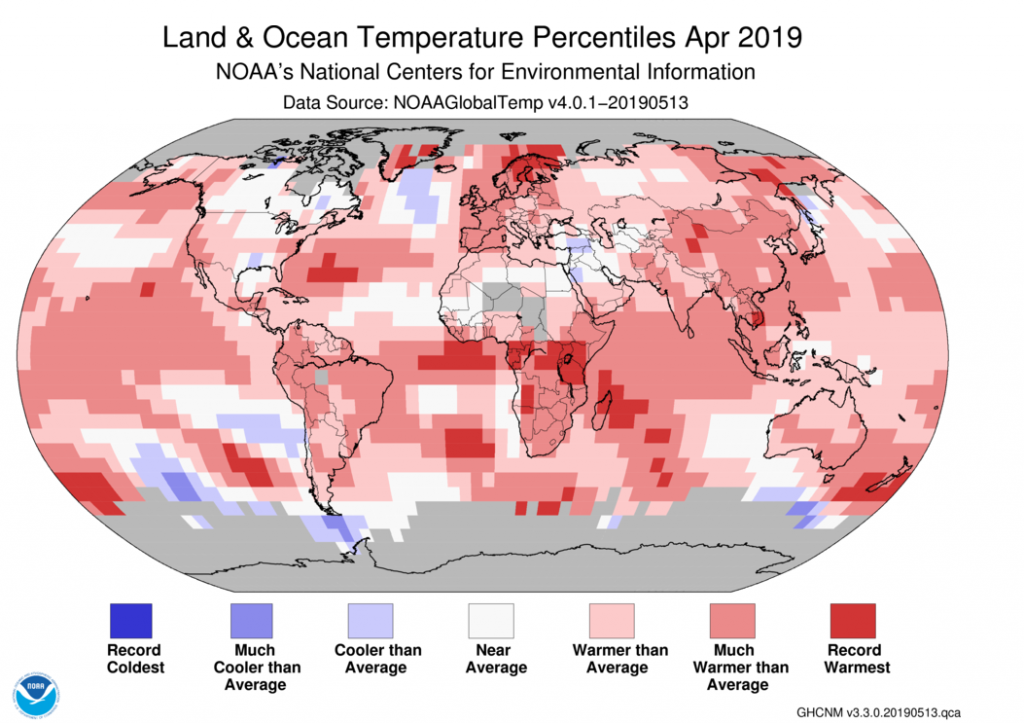24 May 2019
Another Climate Change Surprise?
Posted by Dan Satterfield
What worries me most about our reckless experiment with the planet’s thermostat is not the predictions of sea level rise and the changes in rainfall patterns etc. What we’d better not ignore are the surprises and there are sure to be many of them. Some new research out this month hints at what might be a big one.
Synoptic meteorologists (like me) have gotten much better at forecasting the track of tropical cyclones, but that’s only half of the story. Forecasting the intensity of a tropical cyclone remains a stubborn problem, and most concerning is our frequent failures to forecast a sudden rapid intensification. These failures can be deadly when they happen in a storm that is approaching landfall.
The new research indicates that climate warming may make rapid intensification events more likely because of a drop in vertical wind shear. Tropical systems prefer lighter atmospheric winds that do not change speed or direction much as you climb into the higher atmosphere. Many times a growing storm will encounter a sudden increase in wind shear and fall apart, but just the opposite can happen and (all things being equal) it might rapidly intensify.
NOAA’s Climate.Gov website has a good explainer on this research, but here’s the worry: This may be a climate surprise of a warmer world. Rapidly intensifying hurricanes (that are much wetter as well). A hurricane forecast at the National Hurricane Center will tell you the three words that can make them awake in a cold sweat. You’ve likely never heard the term: Emergency Hurricane Warning. Those are issued when the forecasters cannot give the normal lead time to residents.
Residents who are about to get plastered.

Just pointing out that April 2019 was the second warmest on record. This was the 412th consecutive month and the 43rd consecutive April with temperatures, at least nominally, above the 20th-century average.
Humans are lousy at dealing with slow-motion disasters (SMD) and climate change is a text-book example of one. We almost always assign the blame not to the SMD that deserves it, but to a more short term explanation. In other words, it was a bad numerical model forecast that caused the need for emergency hurricane warnings, while ignoring the hard reality that we turned up the global thermostat and messed up our climate.
How will the history books explain to students 60 years from now when they ask why we purposefully messed up our climate?
The answer is easy: people voted for what they wanted to be true instead of taking the time to research what really IS true. Fear causes that, and even if the fear is justified, it does not change the science. The science really does not care. Remember my favorite quote by Richard Feynman: Science is what we do to keep from lying to ourselves.
Just teaching basic critical thinking awareness in high school and college might make a big difference. Reading any main-stream news site in 2019 should convince you that critical thinking 101 is a course that’s long overdue. Spending ten minutes on a social media site might make you think it’s already too late.
I sure hope not.


 Dan Satterfield has worked as an on air meteorologist for 32 years in Oklahoma, Florida and Alabama. Forecasting weather is Dan's job, but all of Earth Science is his passion. This journal is where Dan writes about things he has too little time for on air. Dan blogs about peer-reviewed Earth science for Junior High level audiences and up.
Dan Satterfield has worked as an on air meteorologist for 32 years in Oklahoma, Florida and Alabama. Forecasting weather is Dan's job, but all of Earth Science is his passion. This journal is where Dan writes about things he has too little time for on air. Dan blogs about peer-reviewed Earth science for Junior High level audiences and up.
Sadly, more education doesn’t really help. The human species has evolved to be blind to unpleasant truths and we will continue our path of overshoot until nature/physics/biology intervenes in a rather brutal way. https://www.newyorker.com/magazine/2017/02/27/why-facts-dont-change-our-minds?
Which is why we need to teach critical thinking skills in high school AND college. When people understand cognitive dissonance, they may step back and consider their thought process more deeply.
Dan this is so true. You have suscintly put into words what l’ve tried to say. The flooding will become epic as it’s already becoming. I too am a Feynman fame. Discovered him as a physics undergrad and have rediscovered him via reworked YouTube videos of his many talks.